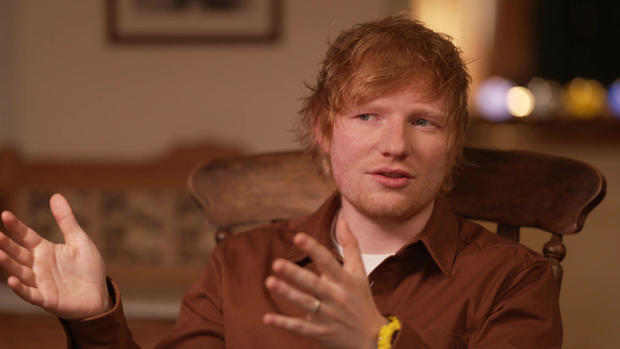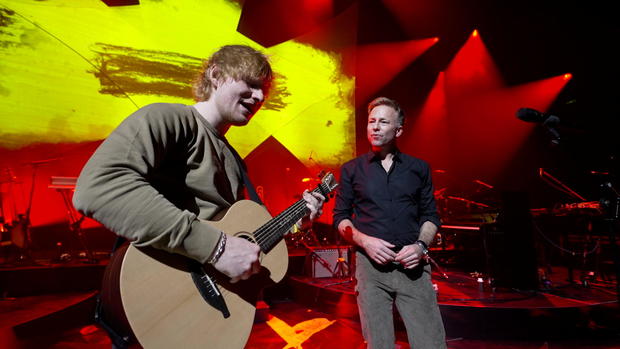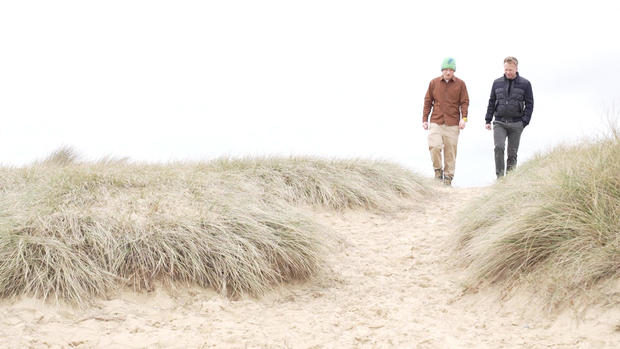Pop star Ed Sheeran has been on a stage of a different sort this past week, defending himself in court against a claim of plagiarism. “I’m obviously very happy with the outcome of the case,” he said in New York City on Thursday, “and it looks like I’m not going to have to retire from my day job after all.”
The lawsuit alleged he’d copied parts of Marvin Gaye’s 1973 hit “Let’s Get It On,” with his Grammy-winning song, “Thinking Out Loud.”
When “Sunday Morning” spoke with Sheeran before the trial, near his home in England, his reps did not want him talking about the case.
Doane asked Sheeran, “How is that as an artist, as a creator?”
“I just think it comes with the territory,” he replied, then referenced a publicist off-camera. “Glenn’s getting nervous now! But four chords that get used in pop songs … Glenn, honestly, it’s fine!”
CBS News
“There’s, like, four chords that get used in pop songs,” Sheeran continued. “And if you just think mathematically, the likelihood of this song having the same chords as this song? There’s multiple, multiple songs. It’s all the same four chords – some of them are like A, B, C …” Sheeran then turned his attention back off-camera. “Dude, I’m a musician. I can f***ing speak about this.
“You are going to get this with every single pop song from now on,” Sheeran stated, “unless it just stops, which I don’t think it does, because it’s a big money business to take things to court. But like, you can only get caught out if you’ve done something wrong. And I’m not. I have not done something wrong. I used four chords that are very common chords to use.”
Doane asked, “Are you cool?”
“Yeah. Yeah. It just, it riles me up, man.”
The verdict was not the only good news for Sheeran this past week. Critics are praising his new album, “Subtract,” released Friday.
You can stream a YouTube playlist of Ed Sheeran’s album “Subtract” by clicking on the embed below.
Interestingly, it was not the record the 32-year-old was planning to release. “I had to kind of get my head ’round scrapping ten years of work to replace it with, like, a month’s worth of work,” he said.
Doane asked, “Explain that: you’ve written all of these songs, you plan for a totally different album, and then life happens and you change course?”
“Pretty much, yeah.”
He chronicles the process in a new docu-series on Disney+, called “Ed Sheeran: The Sum of It All.”
Sheeran said, “My wife had gone in for a checkup and they found a tumor in her, and she was six months pregnant. And I then wrote a bunch of songs about that. …”
Right now in the waiting room, emotions running wild
Worried ’bout my lover and I’m worried ’bout a child
Part of me was always in denial
It’s gonna take a little while
In our story, loving, lover
We are glorious
“Sycamore” by Ed Sheeran
“Then, about a week later, my best friend died. And so, I then wrote a bunch of songs about that…”
I pictured this month a little bit different, no one is ever ready
And when it unfolds, you get in a hole, oh, how can it be this heavy?
Everything changes, nothing’s the same, except the truth is now you’re gone
And life just goes on
“Eyes Closed” by Ed Sheeran
At the same time, he was in the middle of an earlier copyright case, which he also won. “And then I went into this, like, really, really public high-profile court case where you’re being sort of shouted at every day and called a liar and a thief and stuff. So, I’d written about, you know, the fear, or depression, or anxiety, or all of these things that had been encapsulated in that time, were what the songs ended up being about.”
The result is a stripped-down return to Sheeran’s singer-songwriter roots. It’s a departure from the string of polished pop hits that have made him one of the world’s bestselling music artists.
At Kings Theatre, in Brooklyn, N.Y., about an hour before taking the stage for the sold-out debut of his new album, Sheeran seemed decidedly relaxed. “I’m quite, like, comfortable in my skin,” he said. “I know who I am and what I do.”
CBS News
“The lyrics in some of these songs seem to paint another picture, of not being so comfortable in your skin?” asked Doane.
“Yeah. But that’s the human; you’re talking to the artist right now. The artist who can stand on stage in front of 110,000 people in Melbourne is not the same person that has anxiety and insecurity and depression. And yeah, it’s not the same person. You put on a cape, I guess, and go, I can entertain you, and this is good. But if I was that off-stage, all the time? It’s horrible. You’re just this egotistical maniac walking around!”
The British musician has been selling out stadiums on his “Mathematics” tour, which just started in the U.S. Part of what makes the artist Ed Sheeran so successful is that he is willing to expose that human side.
Doane asked, “Paint a picture of you as a kid?”
“Really small,” he said. “I had red hair. I had these big pink glasses. I had a stutter. This is before I played music, so I didn’t have anything impressive that I could offer, and I was just weird.”
“Do you think of that kid, you?”
“All the time. Yeah. I find it bonkers.”
Sheeran spoke about his weight issues: “I keep my weight in check now because I do a lot of exercise, but I’ve just always been a fat bloke,” he said.
“You’re not fat!”
“Well, I know, because I keep it in check. I did, like, an hour-and-a-half worth of exercise this morning. And I’ll be on stage for another two hours today. Like, I watch what I eat and I exercise a lot and I try to not binge as much.”
He’s open about that struggle, to a point. “I just don’t want it to turn into, like, the poster boy for it, you know?” he said. “I think what is important about speaking about it is letting people know that it is not a problem that is just for one gender.”
By “it,” he’s talking about bulimia. Showing that kind of vulnerability can require a level of confidence that’s apparent when Sheeran takes the stage.
Doane said, “This ego that a performer needs to have – where did it come from in your case?”
“Oddly, no one caring,” Sheeran replied. “I guess I developed it from the age of, like, 15, playing in rooms where I was largely ignored. I don’t know, if you went to a bar and there was a kid being like, Hey guys, this song is good, listen to this, you’d be, like, okay.”
His songs are good, if selling 150 million albums is any measure. The single from his new album about his friend’s death has topped charts, putting Sheeran in third for the most #1 hits in the U.K., just behind Elvis Presley and The Beatles.
“It’s a really personal song for you,” said Doane.
“Yeah, all my albums are super-personal,” Sheeran said. “They’re all reflections of where I am at that time, and this is more uncomfortable, I think.”
Sheeran refers to this “uncomfortable” period lyrically, as the “End of Youth.”
We spend our youth with arms and hearts wide open
and then the dark gets in and that’s the end of youth
I’ve been lost since the teens but pretend it’s all alright
All my ups led to falls that led to trying to end my life
Just a boy at the start, they lent on like a man
You were meant to be my friend and not to take all that you can.
“End of Youth” by Ed Sheeran
Doane asked, “Is that autobiographical?”
“Totally, yeah. Totally,” he said. “But then, this is like, again, it’s uncomfortable talking about these things on interviews because you don’t necessarily want the whole world to know everything that is going on in your mind the entire time. But then, if you write songs about things, and you’re then releasing the songs, you should be giving context to them.”
Music helps him process, and at home on the English coast, he finds perspective.
CBS News
Doane asked, “How much do you care about what’s written and what’s said about your work, about an album?”
“I mean, I used to care a lot,” Sheeran replied, “because I spent my whole life trying to become successful. But you’re not always going to be everything to everyone. Like, I’ve never really been, like, a critical darling. But I don’t know. I think it’s more challenging to write pop music than any other kind of music.”
Critics’ minds may change, but Sheeran is unwavering when it comes to the value of a good pop song. “Songwriting doesn’t always have to be really, like, introspective and emotional,” he said. “Sometimes something, like, can just be fun. Like, ‘Shape of You’ is just a fun song. No one listens to ‘Shape of You’ and thinks deep and hard about their life. They just, ‘Oh, I quite like, I quite like that song. I quite like dancing to it.'”
For more info:
Story produced by Mikaela Bufano. Editor: Steven Tyler.
See also:


